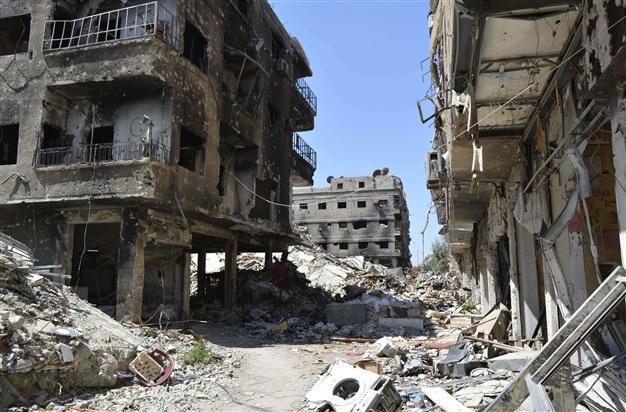UN demands aid access to Syria's Yarmuk after ISIL attack
DAMASCUS - Agence France-Presse

A general view taken on April 6, 2015 shows destruction in Yarmuk Palestinian refugee camp in the Syrian capital, Damascus. AFP Photo
The UN Security Council has demanded humanitarian access to Syria's Yarmuk Palestinian refugee camp as residents described fleeing in terror after the arrival of jihadists of the Islamic State of Iraq and the Levant (ISIL).
The advance by the extremists into the battered neighbourhood of south Damascus has alarmed the international community and Palestinian officials, with a delegation from the West Bank heading to Syria to discuss the situation.
The Security Council expressed deep concern about the situation on Monday, said Jordan's ambassador Dina Kawar, who chairs the council this month.
It called "for the protection of civilians in the camp for ensuring a humanitarian access to the area including by providing life-saving assistance," Kawar said.
It also stood ready to consider "further measures to provide necessary assistance," she added, without providing details.
The call came after the council held a closed-door meeting on the crisis and heard from the head of the UN agency for Palestinian refugees about the plight of the camp's 18,000 or so remaining residents.
UNRWA chief Pierre Krahenbuhl described the situation as "more desperate than ever."
He urged countries with influence in Syria to act "for civilian lives to be spared and for humanitarian access to be given."
"What civilians in Yarmuk are most concerned about right now is bare survival," he said.
ISIL jihadists began an assault on Yarmuk last Wednesday, and were initially repelled by Palestinian fighters but have since seized large swathes of the district.
Nearly 40 people have been killed in the fighting, according to the Syrian Observatory for Human Rights.
The Britain-based group said ISIL forces were present in the south, west and east of the camp, with Palestinian fighters largely confined to the north.
Syrian government forces have dropped barrel bombs on ISIL positions in the camp, it added.
The ISIL attack is just the latest blow for Yarmuk, which was once a thriving, working-class residential district of the capital, home to some 160,000 people -- Syrians and Palestinians.
The camp, the largest of its kind in Syria, has suffered repeated bombardment and has been under a government siege for more than 18 months.
The embargo was so tight at one point that there were reports of deaths from shortages of food and medicines. Residents said they survived on wild herbs and plants.
An agreement last year allowed a slight easing of the siege, but humanitarian access has remained limited.
Late last week, several thousand residents were able to escape, with some taking refuge in the government-held Damascus district of Tadamun.
They said they had endured the siege and shelling, but that the advance by IS was the last straw.
"I left the camp despite myself," said Um Usama, a 40-year-old, who lived in Yarmuk for 17 years.
"I'd stayed on despite the bombings and famine," she said, at a school serving as a shelter.
"Daesh's arrival meant destruction and massacre," she added, using an Arabic acronym for IS.
"Their behaviour's not human and their religion is not ours," added the thin woman with sunken eyes.
Other residents said IS had carried out beheadings and beatings.
At least seven Palestinian fighters were executed by the jihadists, including two who were beheaded, the Observatory said.
The plight of the camp's residents has raised concern in the Palestinian territories, where both president Mahmud Abbas and the rival Hamas movement have called for Yarmuk to be spared.
A delegation led by Palestine Liberation Organisation official Ahmed Majdalani was due to hold talks in Damascus later on Tuesday.
Majdalani told AFP ahead of the trip that he would talk to Syrian officials about securing a corridor to allow aid in and civilians out.
